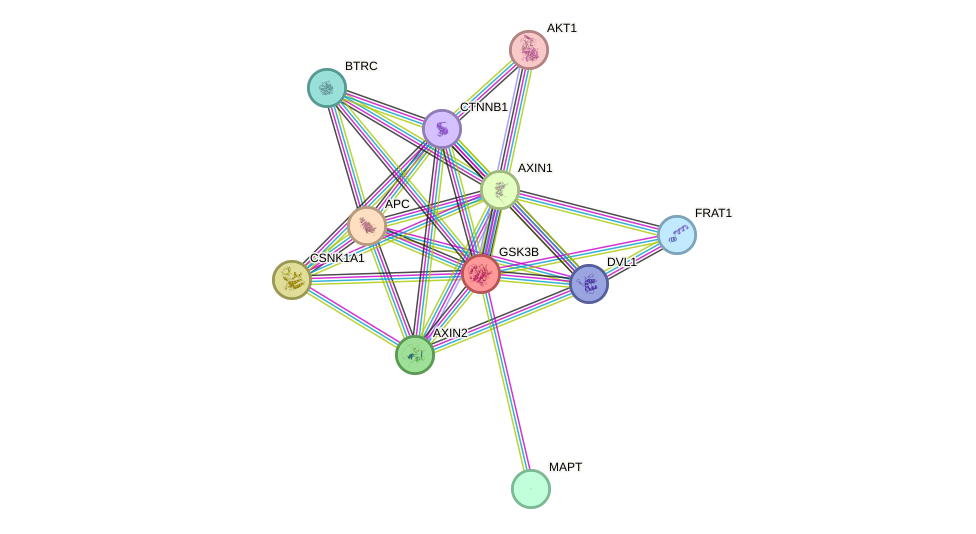GenAge entry for GSK3B (Homo sapiens)
Gene name (HAGRID: 97)
- HGNC symbol
- GSK3B
- Aliases
- Common name
- glycogen synthase kinase 3 beta
Potential relevance to the human ageing process
- Main reason for selection
- Entry selected based on evidence showing that the gene product to be a target of genes previously linked to ageing
- Description
Involved in development and metabolism, GSK3B may also play a role in cell survival. GSK3B null mice die at embryonic stages [522]. Adult overexpression of GSK3B in the brain of mice resulted in neurodegeneration, suggesting GSK3B could be related to Alzheimer's disease [1682]. Its part in human ageing, if any, is unknown.
Cytogenetic information
- Cytogenetic band
- 3q13.3
- Location
- 119,821,955 bp to 120,094,417 bp
- Orientation
- Minus strand
Protein information
- Gene Ontology
-
Process: GO:0000320; re-entry into mitotic cell cycle
GO:0001837; epithelial to mesenchymal transition
GO:0001954; positive regulation of cell-matrix adhesion
GO:0005977; glycogen metabolic process
GO:0006349; regulation of gene expression by genetic imprinting
GO:0006468; protein phosphorylation
GO:0006611; protein export from nucleus
GO:0006983; ER overload response
GO:0007212; dopamine receptor signaling pathway
GO:0007409; axonogenesis
GO:0007520; myoblast fusion
GO:0007623; circadian rhythm
GO:0009887; animal organ morphogenesis
GO:0010614; negative regulation of cardiac muscle hypertrophy
GO:0010800; positive regulation of peptidyl-threonine phosphorylation
GO:0010822; positive regulation of mitochondrion organization
GO:0010977; negative regulation of neuron projection development
GO:0014043; negative regulation of neuron maturation
GO:0016055; Wnt signaling pathway
GO:0016477; cell migration
GO:0018105; peptidyl-serine phosphorylation
GO:0018107; peptidyl-threonine phosphorylation
GO:0021766; hippocampus development
GO:0031333; negative regulation of protein complex assembly
GO:0031334; positive regulation of protein complex assembly
GO:0032091; negative regulation of protein binding
GO:0032092; positive regulation of protein binding
GO:0032436; positive regulation of proteasomal ubiquitin-dependent protein catabolic process
GO:0032886; regulation of microtubule-based process
GO:0033138; positive regulation of peptidyl-serine phosphorylation
GO:0035372; protein localization to microtubule
GO:0035556; intracellular signal transduction
GO:0035729; cellular response to hepatocyte growth factor stimulus
GO:0036016; cellular response to interleukin-3
GO:0043066; negative regulation of apoptotic process
GO:0043161; proteasome-mediated ubiquitin-dependent protein catabolic process
GO:0043547; positive regulation of GTPase activity
GO:0044027; hypermethylation of CpG island
GO:0044337; canonical Wnt signaling pathway involved in positive regulation of apoptotic process
GO:0045444; fat cell differentiation
GO:0045719; negative regulation of glycogen biosynthetic process
GO:0045732; positive regulation of protein catabolic process
GO:0045773; positive regulation of axon extension
GO:0045944; positive regulation of transcription from RNA polymerase II promoter
GO:0046777; protein autophosphorylation
GO:0046827; positive regulation of protein export from nucleus
GO:0051534; negative regulation of NFAT protein import into nucleus
GO:0060070; canonical Wnt signaling pathway
GO:0070059; intrinsic apoptotic signaling pathway in response to endoplasmic reticulum stress
GO:0071109; superior temporal gyrus development
GO:0090090; negative regulation of canonical Wnt signaling pathway
GO:0097192; extrinsic apoptotic signaling pathway in absence of ligand
GO:0099565; chemical synaptic transmission, postsynaptic
GO:1900034; regulation of cellular response to heat
GO:1900181; negative regulation of protein localization to nucleus
GO:1901030; positive regulation of mitochondrial outer membrane permeabilization involved in apoptotic signaling pathway
GO:1901216; positive regulation of neuron death
GO:1904339; negative regulation of dopaminergic neuron differentiation
GO:1904885; beta-catenin destruction complex assembly
GO:1904886; beta-catenin destruction complex disassembly
GO:2000077; negative regulation of type B pancreatic cell development
GO:2000466; negative regulation of glycogen (starch) synthase activity
GO:2000727; positive regulation of cardiac muscle cell differentiation
GO:2000738; positive regulation of stem cell differentiation
Cellular component: GO:0005634; nucleus
GO:0005737; cytoplasm
GO:0005739; mitochondrion
GO:0005813; centrosome
GO:0005829; cytosol
GO:0005886; plasma membrane
GO:0014069; postsynaptic density
GO:0030426; growth cone
GO:0030529; intracellular ribonucleoprotein complex
GO:0030877; beta-catenin destruction complex
GO:0043025; neuronal cell body
GO:0043198; dendritic shaft
GO:0048471; perinuclear region of cytoplasm
GO:1990909; Wnt signalosome
Hide GO termsFunction: GO:0001085; RNA polymerase II transcription factor binding
GO:0002020; protease binding
GO:0002039; p53 binding
GO:0004672; protein kinase activity
GO:0004674; protein serine/threonine kinase activity
GO:0005515; protein binding
GO:0005524; ATP binding
GO:0008013; beta-catenin binding
GO:0016301; kinase activity
GO:0019901; protein kinase binding
GO:0031625; ubiquitin protein ligase binding
GO:0034236; protein kinase A catalytic subunit binding
GO:0050321; tau-protein kinase activity
GO:0051059; NF-kappaB binding
Protein interactions and network
- Protein-protein interacting partners in GenAge
- TP53, E2F1, PTPN11, PTPN1, AKT1, MYC, HSP90AA1, TOP2A, NFKB1, CEBPB, STK11, GSK3B, PRKCA, PRKDC, AR, FEN1, FOXO1, FOXM1, APP, RELA, PTK2, JUN, EEF1A1, CREB1, MAPT, MDM2, MTOR, CTNNB1, PSEN1, PPP1CA, PPARGC1A, NFE2L2, RICTOR, NFE2L1
- STRING interaction network
Retrieve sequences for GSK3B
Homologs in model organisms
- Danio rerio
- gsk3b
- Drosophila melanogaster
- sgg
- Mus musculus
- Gsk3b
- Rattus norvegicus
- Gsk3b
- Saccharomyces cerevisiae
- MRK1
In other databases
- CellAge
- This gene is present as GSK3B

